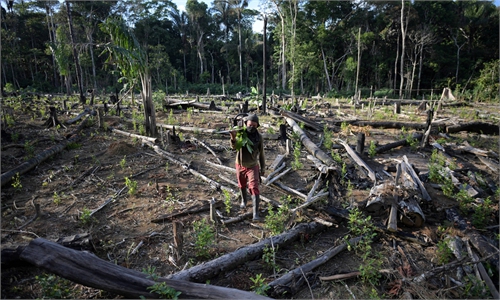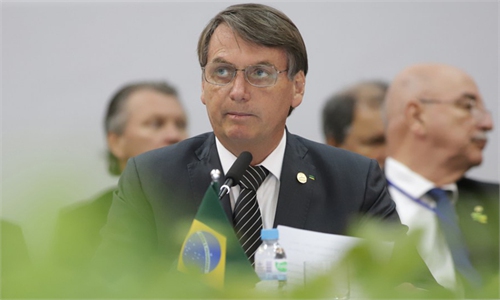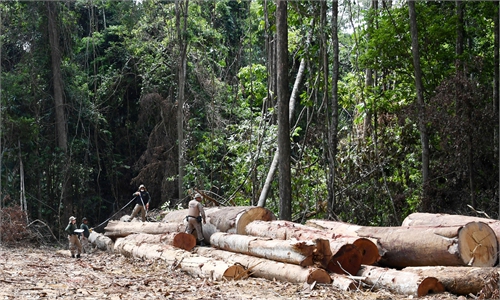
Indigenous people from various tribes protest against Brazilian President Jair Bolsonaro in front of the National Congress in Brasilia, on April 13, 2022. Photo: AFP
Malaria cases among Yanomami indigenous people living in the Brazilian Amazon have soared by more than 12 times since 2014, as illegal gold mining intensifies in the world's largest rain forest, health researchers say.Miners leave behind gaping craters in the ground as they clear huge tracts of forest, creating ideal conditions for the spread of malaria, a disease carried by mosquitoes that thrive in standing water, said Paulo Basta, an epidemiologist specializing in indigenous health.
Gold mining also destroys other plants, scares off wildlife and contaminates the soil and rivers with mercury, which is used to separate gold from other minerals, said Basta, who is also a senior researcher at leading Brazilian biomedical research center Fiocruz.
"This process affects the balance of the local ecosystem, creating favorable conditions for the proliferation of mosquito-transmitted diseases," he told the Thomson Reuters Foundation.
Junior Hekuari Yanomami, head of the Yanomami health council, said heavily armed illegal miners are tearing through the group's land on the border between Venezuela and Brazil, sometimes leaving holes the size of soccer stadiums.
"They destroy everything: trees, rivers, every single thing," he said in a video call. "It is a total invasion of the Yanomami territory."
There are more than 26,000 Yanomami living in the northern Amazon region, according to government data, making up Brazil's largest indigenous reservation.
After a spate of attacks on indigenous Amazon communities, including one in which miners killed two Yanomami in 2020, the Brazilian Supreme Court in 2021 ordered the government to adopt "all necessary measures" to protect the life and health of the Yanomami and Munduruku people from wildcat gold miners.
But the government has done little to help, Junior Hekuari Yanomami said, estimating there are currently about 25,000 illegal miners inside Brazil's indigenous territories.
The Ministry of Health's indigenous health service, SESAI, did not reply to repeated requests for comment.
Curbing rising Amazon deforestation is vital to preventing runaway climate change impacts because of the vast amount of planet-heating carbon dioxide absorbed by the forest's trees.
Brazil's far-right President Jair Bolsonaro has encouraged mining and farming in protected areas of the Amazon, saying the activities are essential to lifting indigenous groups out of poverty and improving the lives of 30 million Brazilians who live in the region.
The country's constitution bans mining in indigenous territories, but Bolsonaro has tried to push through a bill to allow mining on indigenous reservations for potash, a potassium-rich salt and key ingredient in fertilizer.
Brazil usually gets a quarter of its potash from Russia, which halted exports when the crisis in Ukraine began.
Congress has approved the creation of a task force to analyze the bill, ahead of a possible vote, but the president's persistent calls to develop the Amazon have already helped drive a surge in deforestation.
According to INPE, Brazil's space research agency, 430 square kilometers of forest were cut down in January 2022, a figure five times higher than the same month a year earlier.
INPE also showed that in the two years after Bolsonaro took office in 2019, deforestation inside indigenous territories rose sharply, including on Yanomami land, which lost 40 square kilometers of forest in that period - six times more than in the two years before the president's election win.
'In the ICU'
Malaria outbreaks go hand-in-hand with illegal mining and deforestation, Basta said.
He said there have been two significant malaria outbreaks in Brazil since 1959, both of them linked to Amazon gold rushes.
Analyzing data from the health ministry, Basta noted that during a burst of wildcat mining in the 1980s, the number of malaria cases in the country jumped to more than 500,000 per year, compared to about 100,000 per year in the decade prior.
Case numbers came down only after the launch of a national program in the early 2000s that included investment in local health services and better tracking of malaria cases.
The spread of malaria peaked again between 2018 and 2019, during what Basta calls "the second gold rush," reaching 200,000 reported cases a year.
In Yanomami territory, malaria cases have risen substantially since 2014.
That year, there were 966 cases of malaria among the Yanomami, five of them caused by the deadliest form of the disease, Plasmodium falciparum malaria, Basta said.
By 2020, the date of the most recent consolidated figures, there were more than 11,800 malaria cases recorded in the community.
Figures on how many of those cases resulted in death are not readily available.
Junior Hekuari, the Yanomami leader, said malaria is only one of a slew of illnesses that have been plaguing his community since illegal gold miners began encroaching on their land, dirtying the rivers and scaring away the fish and game that the community survives on.
"[Children] get sick, frequently with diarrhea, because they are drinking dirty water from the river. I even saw a 3-year-old child who had three different illnesses all at once: pneumonia, diarrhea and malaria," he said.
"Yanomami health is in the ICU. To get out of the ICU, you need proper government planning, in partnership with specialists."
Deadlier epidemics
The role of deforestation in spreading malaria isn't limited to the watery mosquito breeding grounds left behind by illegal miners, said Pedro Vasconcelos, president of the Brazilian Society of Tropical Medicine.
Massive tree loss is shifting regional rain patterns and making long-term weather cycles more erratic.
The resulting rising temperatures and sudden, heavy bouts of rainfall create prime breeding conditions for mosquitoes, Vasconcelos said.
This has led to a rise in rates not only of malaria but also other mosquito-borne viruses such as chikungunya, which causes fever and joint pain, yellow fever and Zika in parts of Brazil as well as Bolivia, Peru and other nearby countries, he said.
As long as the Amazon is being battered by climate change and razed by illegal miners and loggers, Brazil and its neighbors face a future of stronger, more widespread diseases, warned Vasconcelos.
Reuters



